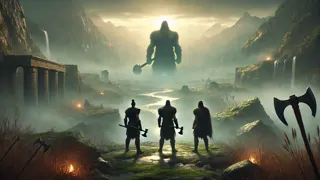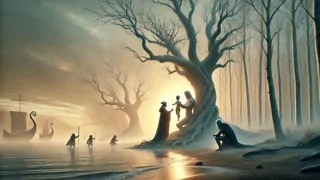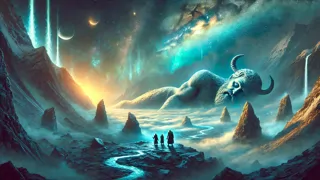Introduction
In the chill, unformed void before time had a name, when the world was nothing but fathomless darkness veined with silence, the wellsprings of existence churned unseen. There stood the yawning chasm of Ginnungagap, a realm untouched, its winds neither warm nor cold, its silence carrying endless promise and unfathomable dread. To the north, Niflheim exhaled icy breath, releasing mists and frozen venom that seeped ever southward. Across the divide, Muspelheim radiated with molten embers and radiant flames, casting halos of hungry heat into the oblivion. When these primordial energies met—icy venom quenching blazing sparks—miracles and monsters stirred awake. Frost and fire, joined by fate, spawned something unimaginable: the great giant Ymir, whose size defied every notion, whose being pulsed with the wildness of creation itself. Beneath his closed lids, dreams rippled into reality. His sweat begot other giants, a grim and growing kin, while the nourishing cow Audhumla emerged from frozen rime to provide life-giving rivers of milk. As she grazed salted ice, her tongue revealed Búri, the ancestral god, whose descendants would shape destiny in ways even gods could scarcely imagine. These beings lived beneath a sky undreamed, amid shifting frost smoke and flickering auroras, as raw and uncharted as the vast gulf itself. This was a time before order, when the world was only potential and risk, when every heartbeat of the giant shaped the makings of future worlds. As Ymir slumbered, his restless body became the crucible for a universe, his blood a surging promise, his bones the foundation stones of things to come. The world’s beginning was woven not from peace, but from conflict—born of the clash between elements and ages, written in the cosmic struggle between chaos and the siblings longing for form. And in time, from the line of gods, three brothers emerged—Odin, Vili, and Vé—stronger and stranger than all who had come before. The saga of the world’s awakening from Ymir’s body, and the birth of gods and people, was poised to unfold across a stage cut from ancient ice and fire.
The Birth of Ymir and the Realm of Chaos
Before any gods ruled and before even the first breath of wind caressed the snow, the world was void, an abyss echoing with possibility. In the heart of this abyss, Ginnungagap yawned between worlds. On its northern ledges, Niflheim’s mists thickened over eons, weaving heavy curtains of rime and shadow. Its glacial rivers, twelve in all, trickled venom into the emptiness, freezing and winding, painting the air with frozen slivers of memory and fate. Facing this darkness, Muspelheim burned—a fierce, living volcano of a land, where the very stones trembled with heat and spirits laughed in showers of sparks.

When these northern and southern powers met, they clashed with a roar no human throat could echo. The ice retreated before the fire, dripping and melting, until great steaming waves roiled and surged, birthing the first stirrings of life. From this alchemy of elements, the frost giant Ymir drew his first breath. He stretched upward, vast as a mountain range; every exhalation became a wind, every stir a tremor. Ymir was utterly alone in the new world—a being wrought not by design, but out of the inevitability of two forces meeting and refusing to yield.
Ymir’s body seeded generations. Sweat pooled in the valleys beneath his trunk-like arms, pooling and moving with uncanny will. From these fluids, other jotnar took form—creatures of ice and fury, their minds foggy but their hunger insatiable. The world itself pressed close, unformed and waiting for a nudge. And while Ymir slumbered, Audhumla was born: a colossal cow, shimmering white, whose pink tongue lapped at bitter, salty blocks beside Ymir’s vast frame. Rivers of milk spouted from her flanks, rolling across rock and feeding the nascent brood of giants. Audhumla, gentle and strong, revealed something neither Ymir nor his kin could foresee as she shaped the first ancestral god from within the ice itself.
Day after day, Audhumla’s tongue worked the salted frost, until by the end of the third day, warm and promising, the face of Búri looked out. Then shoulders broke free, then arms—Búri emerged in full, silent as a shadow but radiating potency. From Búri’s line came Borr, a towering figure whose own son would change everything: Odin, wise and restless, with his younger brothers Vili and Vé—each distinct, each essential.
This seed of order grew secretly as the giants slumbered and multiplied, their dreams swirling above the vaporous ground. The gods, children of Búri, looked upon Ymir and his kin with wary hearts. For all their cosmic power, the gods recognized that a world cannot be built atop disorder alone. And so, from the stillness and churn of Ginnungagap grew a tale as old as creation itself: the struggle between chaos and the shaping hand of willful divinity.
In the shadow of Ymir’s mountainous form, the gods were resolved. They saw too clearly that the world’s hope lay buried within the collapse of what had come before. Odin, with eyes bright as winter stars, confided in his brothers: if the world were to be, Ymir must be no more. The brothers gathered their courage beneath the auroras, ready to challenge the lord of the void, wielding not only weapons, but vision. From frost and fire, from blood and resolve, the creation awaited its spark.
The Slaying of Ymir: Shaping the Cosmos from Chaos
Beneath a sky torn with dancing green and gold, Ymir’s frame sprawled heavier than mountain or continent. The air throbbed with primordial power; the nascent gods—Odin, Vili, and Vé—stood vying with their own fate. Their hearts knew the cost of creation would be paid in blood, yet the brothers’ resolve only sharpened as they beheld the chaos around them. While Ymir slept, dreams thick as the northern mists, the three young gods circled him, weapons forged from will and the shimmering essence of new-found purpose.

Odin led, his voice steady, speaking words that would echo for ages. Though Ymir’s strength was absolute, his reckoning had come—not by malice, but by necessity. The gods set upon him silently, a storm breaking over ice-bound quiet. Axes glimmered like stars; the air crackled as muscle met flesh older than history. Ymir’s roar shattered the dawn, rattling the very bones of the world. Wind howled; earth shook. The battle raged—a clash that was as much an act of creation as it was an ending. The first blood sizzled on ice, trickled into crevices, and pooled in valleys. From that river, more destruction than ever known swept the primordial land. Giants fell, swept away in rising red tide, while the gods pressed on—unyielding, transformed by their own daring.
When at last Ymir’s body fell, the world shuddered with both death and birth. Here, the gods began the work of forging cosmos from corpse. First, they heaved Ymir’s hulking body to the center of Ginnungagap, where his blood ran in torrents, shaping oceans and lakes, rivers and waterfalls, their courses wild at first, then slowly harmonizing to the gods’ vision. His flesh, soft yet enduring, became the rich earth—sprawling plains, hills and fertile valleys—capable of bearing green and gold. Odin and his brothers, sweating with the exertion of cosmic labor, shaped crags and caves from Ymir’s bones; the starkest ridges and ancient mountains, secret hollows, all cut from that giant’s frame. Ymir’s teeth and shattered jaw poured forth as stones, slotting together to make scree and bedrock. His hair, wild and dense, turned to trees and undergrowth, seeding forests and the endless carpets of northern mosses.
The brothers were not finished. From Ymir’s enormous skull, they lifted a firmament like an ancient dome—high and endless—fastening its edges to the outermost ends of the newly made world. This was the sky, the heavens, arching protectively over the land. From skull’s inside, embers of Muspelheim, scooped up in silent handfuls, became stars flung across blackness, whirling constellations and the moons’ silver gleams. The clouds—those first wisps of breath—curled across this vault, spinning gold and gray and white in constant, shifting dance. And to secure the cosmic order, the gods gathered Ymir’s brain and cast it skyward, forming scudding storm-clouds and drifting mists, forever reminding the world of what chaos had been subdued in its creation. The rivers of venom, remnants of Niflheim’s earliest days, kept their own counsel far beneath, hidden in the roots of mountains or swirling deep within seas, waiting for new tales, distant prophecies, and the whispers of Ragnarok yet to come.
Forging Humanity and the Guardians of Order
With the bones of Ymir torqued into mountains and his blood echoing in each salt wave, the new world took form beneath the gods’ hands. Yet the tapestry remained unfinished. The brothers, moved by their creation’s beauty and their loneliness in its solitude, sought to kindle souls that would sing and struggle beneath their stars. On the new shore, battered smooth by ancient tides, Odin, Vili, and Vé discovered two wind-blown tree trunks. One was sturdy ash, its bark pale and proud; the other, slim elm, wreathed in delicate green. Inspired, the brothers bent low, imbuing the trunks with gifts no other being possessed: Odin breathed spirit and life, Vili granted movement and mind, Vé bestowed voice and form.

Thus awakened, Ask and Embla opened their eyes, blinking at a world so new that even the air shimmered with unspent potential. The gods watched as the first man and woman explored their surroundings, learning the taste of salt on wind, the song of water over stone, the hush of leaves in the deepest woods. Yet the brothers knew that to leave their children unguarded would be to invite chaos anew. Drawing on the last echoes of Ymir’s magic, the gods gave shape to beings who would hold the balance: dwarves, born from the flesh and marrow, springing to life in underground halls, clever and quick, masters of craft. They forged iron and fire below the mountains, hollowing gems and metals from Ymir’s memory.
From the edge of the skull-dome, the gods named four mighty dwarves—Nordri, Sudri, Austri, and Vestri—whose task would be to hold the heavens aloft, safeguarding order and horizon. Thus, the firmament remained steady, stars and moon held in their rounds by these tireless sentinels. All the while, Odin and his brothers set out the boundaries, assigning realms to the elements: Jotunheim for the remaining giants, Midgard for men, Asgard for the gods themselves—linked by Bifrost, the trembling rainbow bridge. Beneath all this, serpents curled in shadow, a memory of chaos tamed, not vanished.
So the first people moved under stars kindled from embers of destruction and hope, living and loving in a world woven from sacrifice and vision. Each dawn was a new spell, each river a flowing tale. The world was not a relic, but a promise: a place of memory, struggle, and wonder, shaped by gods, guarded by dwarves, inhabited by creatures sprung from frost and fire. Even as Odin perched later upon his high throne, watching the nine realms, the dream of Ymir echoed—reminders that all life is built from what came before. In every stone’s hush and ocean’s surge, the world remembered its own making, and the gods watched, silent and wise, for the next fate to spin out from their first, daring act.
Conclusion
The Norse creation is not a story of gentle birth or easy harmony, but one where struggle and transformation birth potential from chaos. Ymir’s sacrifice—his agony and downfall—carved the world’s caverns, seas, and horizons, shaping the land that would cradle all future stories. Order came at cost, yet it gave room for wonder. Odin and his brothers, channeling equal parts vision and courage, wrought a cosmos from what seemed only ruin: transforming violence into meaning, wildness into home. Ask and Embla’s awakening grounded the divine imagination into mortal reality, letting humanity take its first, uncertain steps beneath the sheltering dome made from a giant’s skull. Above, the silver stars remind us that every ending gives rise to creation, and every act of courage remakes the world. As myths endure, the echoes of Ymir’s body ring in the stones, the rivers, the forests, and the tales we still share—a reminder that from chaos comes the possibility of order, beauty, and lasting hope.


















